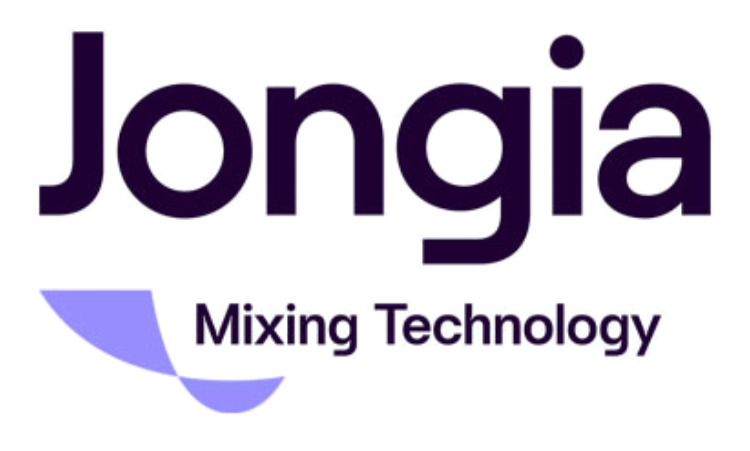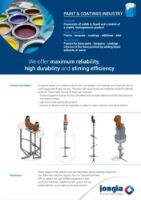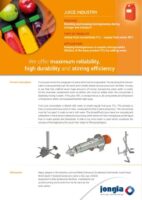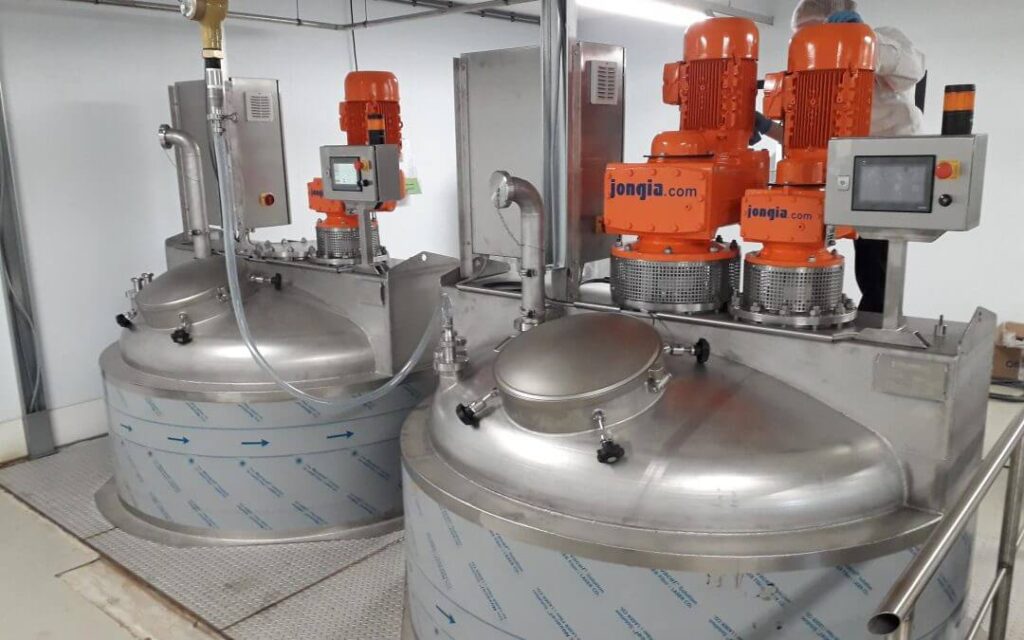
Industrial Agitators
The market of industrial agitators
Industrial agitators play a crucial role in achieving consistent mixtures in various industries, including chemical, pharmaceutical, water treatment, and coatings. These devices come in different types, such as axial flow propellers, anchor agitators, and helical ribbon agitators, to name a few.
In this blog, we’ll discuss the different types of industrial agitators, and the industries where they are used. We’ll also look into the market size of industrial agitators and their impact on different industries.

The Industrial agitator market size
Within the industrial agitators sector, there are many different types, each with his own functionalities. The industrial agitators market size is expected to see significant growth in the coming years, driven by the increasing demand for efficient mixing processes in various industries. The market is expected to be dominated by the chemicals and pharmaceuticals industries, which are among the largest users of industrial blenders. As we said, agitators can be used in many different ways and therefore there are many types.
Types of agitators
Agitation of Mixtures: Agitation of mixtures involves the use of mechanical devices to mix substances together. The purpose of agitation is to achieve a uniform mixture and ensure that all components are evenly distributed. The common types of agitators include axial flow propellers, solid suspensions, mechanical seals, anchor-type agitators, and helical ribbon agitators. Each type is designed to achieve a specific flow pattern and mixing process. But, agitators come in different types, depending on the industry and the type of mixture
- Agitator Family: The agitator family includes various types of agitators, such as mechanical agitators, portable agitators, and vertical agitators. Mechanical agitators are the most common and include axial flow propellers, conical bottoms, flue gas desulfurization, flat blades, anchor-type agitators, and radial flow impellers Portable agitators are used for smaller mixing tanks, while vertical agitators are used for larger tanks.
- Agitators for Water Treatment: Agitators play a crucial role in water treatment processes, such as in the mixing of chemicals and in the removal of solids. Axial flow propellers and turbine agitators are commonly used in water treatment plants.
- Anchor Agitators: Anchor agitators are commonly used in viscous liquids and solids suspension. These agitators have a slower rotation speed, which reduces the amount of air entrainment and minimizes the risk of foaming.
- Axial Flow Agitators: This type of agitators are commonly used in the chemical industry. These agitators have blades that push the mixture parallel to the axis of rotation, creating a flow pattern that promotes mixing.
- Entry Agitators: Entry agitators are used in mixing tanks with low liquid levels. These devices help achieve a uniform mixture and improve the efficiency of the mixing process.
- Portable Agitators: The portable agitators are commonly used in industries that require mobility, such as the water treatment industry. For example, Dynamix agitators offer a wide range of portable agitators. These devices can be easily moved from one location to another to achieve a consistent mixture.
- Top-Mounted Agitators: Top-mounted agitators are commonly used in industrial processes where bottom-mounted agitators are not suitable. These devices are mounted on the top of the mixing tank and use a combination of radial and axial flow to achieve a consistent mixture.
- Turbine Agitators: Another type of agitators are turbine agitators. This type of agitator is commonly used in the production of chemicals and pharmaceuticals. These agitators use a combination of axial flow and radial flow to achieve flow maximization and a consistent mixture.
- Vertical Agitators: Vertical agitators are commonly used in the production of viscous liquids and solids suspensions. These vertical direct motor-driven agitator use a vertical axis of rotation and a combination of radial and axial flow to achieve a consistent mixtured
- Industrial Agitators: Industrial agitators are devices used in various industries to achieve a consistent mixture and improve the efficiency of the mixing process. These devices come in different types and configurations to meet specific industry needs.
- Helical Ribbon Agitators: Helical ribbon agitators are commonly used in the production of viscous liquids, such as in the chemical and pharmaceutical industries. These agitators create a flow pattern that promotes mixing in the axial and radial directions.
We completely understand that this is a pretty long list. If you have lost track of understanding all the different types, feel free to contact Jongia for more information. As an industrial agitator manufacturer, we have all the resources available to tell you exactly which agitator would fit your industrial mixer.
Agitators Vs. Mixers
Agitators and mixers are both used in mixing processes. However, agitators are specifically designed to create flow patterns within the mixing tank, while mixers are used to blend substances together.
Different industries
With all the different types of agitators you can assume that they are implemented in many industrial applications. Agitators are improved for mixing efficiency within industries such as the chemical industry, end-use industry, and the pharmaceutical industry.
- Beverage industry: The beverages industry uses agitators in the production of beverages, such as the mixing of substances for soft drinks and blending flavors for alcoholic beverages.
- Heavy Industry: Heavy industries, such as the automotive and construction industries, use agitators in various processes. These devices help achieve a consistent mixture and improve the energy efficiency of the rapid mixing process.
- Chemical Industry: The chemical industry uses agitators in the large-scale production of chemicals for manufacturing, reagents, and coatings. These devices are also used in heat transfer applications, such as in heat exchangers, where they can measure heat exchange and heat transfer rates.
- Process Industries: Agitators are commonly used in various process industries, such as chemicals, pharmaceuticals, and coatings. These mixtures with components fit for the specific industry helps create immiscible mixtures and improve the efficiency of the production process.
- Coatings Industry: The coatings industry uses agitators in the production of paints and other coatings. These devices help achieve a uniform mixture, resulting in high-quality coatings.
- Construction Industry: Within this industry, agitators are used in the production of concrete and other construction materials. These devices help achieve a consistent mixture, resulting in high-quality materials.
- Cosmetic Industries: The cosmetic industry uses agitators in the production of cosmetics, such as in mixing ingredients for lotions and creams. These devices help achieve a uniform mixture, resulting in high-quality cosmetics.
If you are curious if agitators will fit your specific industry, do not hesitate to contact us. We are more than happy to help you out with all your question related agitators.
Increase in demand of agitators
The demand for agitators is expected to increase in the coming years, driven by the growth of various industries such as chemicals, pharmaceuticals, and water treatment. In our industrial agitator market analysis, we found that the increasing demand for paints and coatings is also expected to contribute to the growth of the industrial agitator market. Also, the drum agitators market is expected to grow in the coming years, driven by the growth of the chemical and pharmaceutical industries. These industries use drum agitators in the production of chemical intermediates and pharmaceuticals.
Industrial Agitators Summarized
In conclusion, industrial agitators play a crucial role in various industries, including chemicals, pharmaceuticals, and water treatment. These devices help achieve a consistent mixture and improve the efficiency of the production process. There are several types of agitators used in industrial processes, including mechanical agitators, propeller agitators, and turbine agitators. As the demand for efficient mixing processes continues to grow, the industrial agitator market is expected to see significant growth in the coming years.
There are many agitator providers on the market, and we understand that making decisions can be difficult. With our experience within the manufacturing industry, we hope we can help you out finding answers to all your questions. Feel free to get in touch with us.
Contact our specialized team for all your questions

Tom Pruymboom
Sales Director
Area Worldwide

Bart Brouwer
Area Sales Manager
Area Worldwide
Technical Questions?

Sijko van der Veen
Application Engineer
Technical Specialist
Popular Posts

The Double Acting Axial Flow Turbine type AST-MTE mixing element
Operation of an AST-MTE Element Operation of an AST-MTE Element This element can be used in both CW (clockwise) and CCW (counterclockwise) directions. In one case, the inner AST element is downward-pumping with the outer tips pumping upward, and in
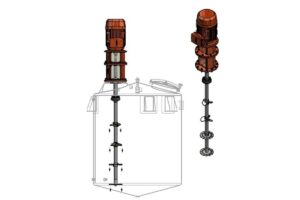
High-Speed Disperser Technology: The Engineering Behind Effective Mixing
A Technical Guide by Jongia Mixing Technology Core Function High-speed dispersers excel at three critical tasks: Fracturing powder agglomerates into fine particles Creating uniform powder distribution throughout liquid mediums Facilitating complete dissolution of soluble materials Operating Principles High-speed dispersers transform

VVTI Biogas Tilburg
VTTI Biogas Tilburg is developing a new bio-energy facility, focusing on processing organic waste. The plant is expected to produce approximately 23 million cubic metres of biogas annually. A portion of this will be converted into green gas for the
